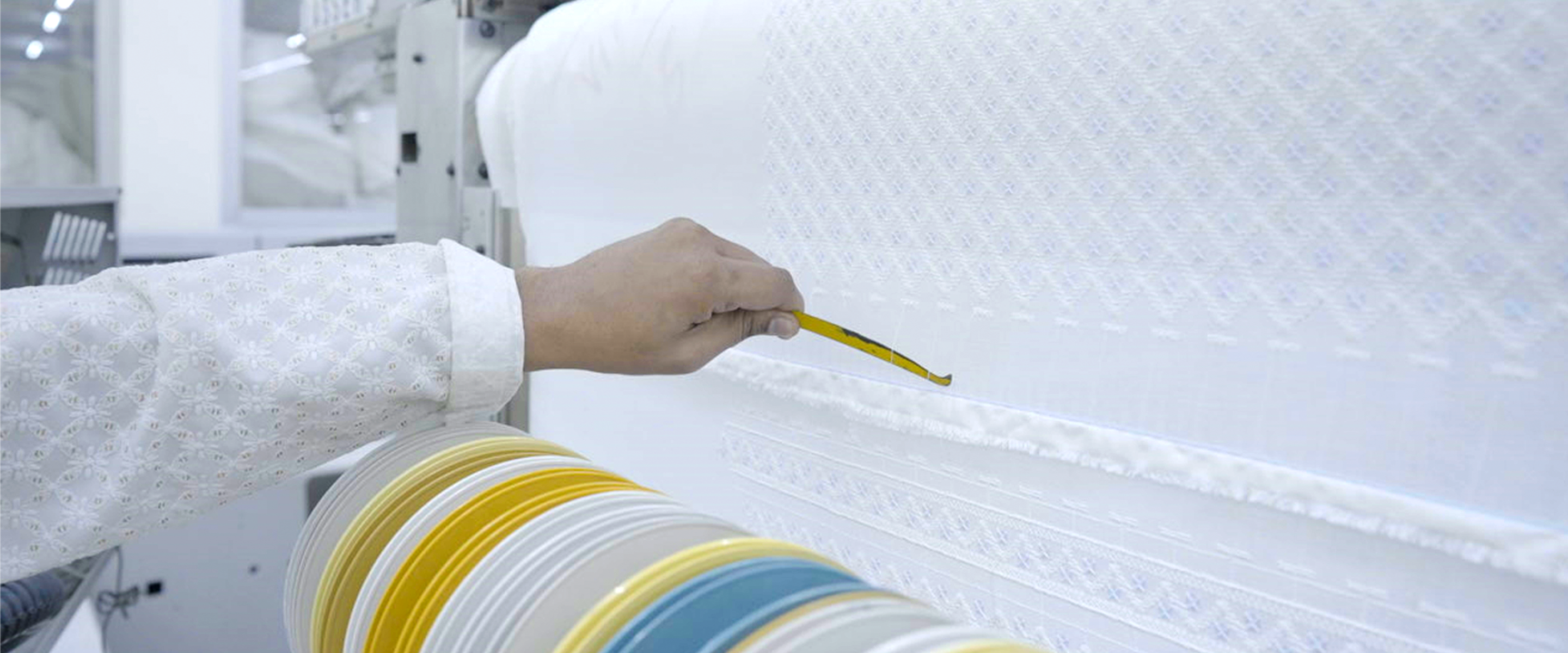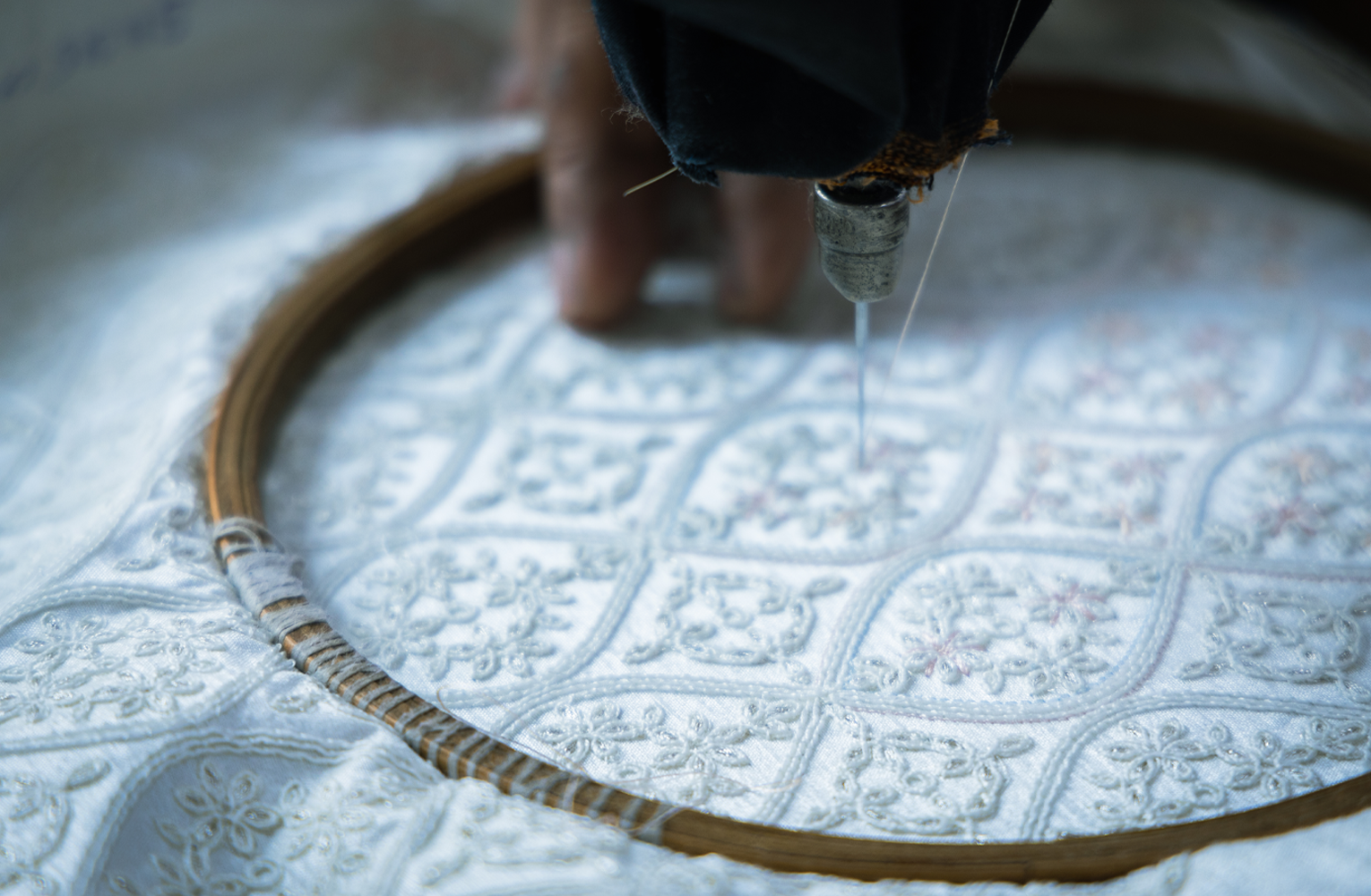Chikankari - The Heritage Craft from India’s Royal Courts
Intricate embroidery, requiring skill, patience, and meticulous effort, epitomizes a blend of artistry and tradition, showcasing a visually striking and textured aesthetic that tells the story of its creators. India, with its deep-rooted history in diverse embroidery techniques, offers a rich archive of stitches, symbols, and motifs that span centuries.
Among these, Chikankari stands out as a poetic and alluring art form from Lucknow, Uttar Pradesh. Believed to have Persian origins, Chikankari is celebrated for its sophisticated white-on-white floral, trellis, and paisley designs embroidered on soft cotton muslin, adorned in subtle pastels, evoking a sense of comfort and wistful nostalgia.
Chikankari stands as a hallmark of finesse in Indian embroidery, offering timeless elegance to its admirers. Utilising thin threads, artisans create elaborate designs, predominantly featuring floral and paisley motifs, on premium fabrics such as cotton, silk, muslin, and chiffon.
Chikankari is renowned for its understated sophistication, this craft skillfully blends subtlety with elegance through patterns that incorporate flowers, leaves, and vines. The addition of sequins and other embellishments introduce a festive flair, elevating its allure for luxurious and ceremonial wear. It is a revered traditional embroidery style celebrated for its fine, delicate and intricate work.
Originally, Chikan embroidery was exclusively performed on white cotton fabric, featuring 75 to 100 stitches for intricate floral patterns. Over time, to align with market trends, it expanded to include various fabrics such as malmal, silk, chiffon, crepe, georgette, organza, muslin, viscose, etc. Lucknowi Chikankari has evolved to incorporate embellishments like Sequins, Aari-Zari, Gota Patti, Bead and Mirror Work, diversifying its traditional appearance.
Stories about Chikankari
Lucknow, the capital of Uttar Pradesh, is famed worldwide for its Chikankari Embroidery, a craft known for intricate floral motifs and creeper designs. Unique to this region and practised for over 200 years, Chikankari, also known as Lucknowi Chikan, emerged as a significant craft centre after the decline of the Mughal court, with subsequent patronage from the Nawabs.
Chikankari's beginnings are shrouded in legend, with its first mentions tracing back to the third century BC when Megasthenes noted Indians wearing flowered muslins. One popular tale recounts a traveller who, upon receiving kindness from a farmer near Lucknow, imparted the Chikankari technique to him as a token of gratitude.
Meanwhile, a different narrative links the art form to the Mughal era, specifically to Emperor Jahangir's court. It was Noor Jahan, Jahangir's queen known for her appreciation of Chikan embroidery, who played a pivotal role in its rise to royal favour and prominence.
Chikankari is distinguished by its variety of stitches and is considered a unique form of embroidery, unparalleled in its complexity and beauty. This intricate embroidery, now enhanced with sparkles, pearls, and jewels, graces the runways of top designers' couture shows.
Chikankari embroidery has diversified, incorporating coloured threads, fabrics, and innovative stitches and designs. This evolution has led to the emergence of unique regional styles, each with its own distinct character.
Innovation in Chikankari
Chikankari continues to flourish, a testament to the beauty of human creation, a bridge between the past and the present. Manyavar, with its new age karigars and design innovation, celebrates the craft by incorporating inspired embroidery into its men's festive collection, offering a blend of sophistication, cultural heritage, and contemporary flair. This integration exemplifies a deliberate harmonisation of antiquity with modern sartorial sensibilities, illustrating the versatility of traditional crafts in the context of contemporary fashion.
Rooted deeply in the rich cultural fabric, Chikankari is celebrated for its exquisite and meticulous hand embroidery on fabric, weaving stories of paisleys and floral motifs. Historically, this art form adorned predominantly women's apparel, such as sarees, kurtas, and lehengas. However, Manyavar's initiative to incorporate intricate embroidery into men's ethnic wear has expanded the allure of this distinguished craft, positioning it as a coveted feature in the world of men's fashion.
In its innovative approach, Manyavar has incorporated Chikankari inspired embroidery across a diverse array of men's ethnic garments, including kurtas, sherwanis, and Nehru jackets. These pieces are meticulously crafted to appeal to the contemporary gentleman who values the timeless elegance of traditional Indian attire yet seeks a modern reinterpretation. The embroidery coupled with embellishments gracefully accent the fabric, infusing subtle elegance, textural nuance, and depth without detracting from the garment's overall design ethos.
For sherwanis and kurtas, Manyavar frequently employs this type of embroidery as an ornamental accent around the neckline, cuffs, and placket, or as understated yet elegant all-over patterns. This artisanal embroidery imparts a touch of opulence to the attire, rendering it perfect for nuptial celebrations, festive gatherings, and other ceremonious occasions.
Furthermore, Manyavar's jackets and Indo-Western sets adorned with Chikankari detail offer a look that seamlessly blends traditional artisanship with modern elegance. Imagine a teal blue jacket showcasing a jaal pattern with intricate Chikan embroidery and sequin highlights, offers a blend of traditional elegance and modern flair.
Through the integration of Chikankari inspired embroidery in men's ethnic wear, Manyavar tribute to the timeless craft and champions the new age karigars of today who are keen on keeping themselves updated with the latest innovations in design.
Manyavar’s endeavour to revitalise interest in Chikankari among the younger demographics and has played a pivotal role in promoting this exquisite craftsmanship on a grand scale, effectively bridging the gap between traditional and contemporary fashion.



